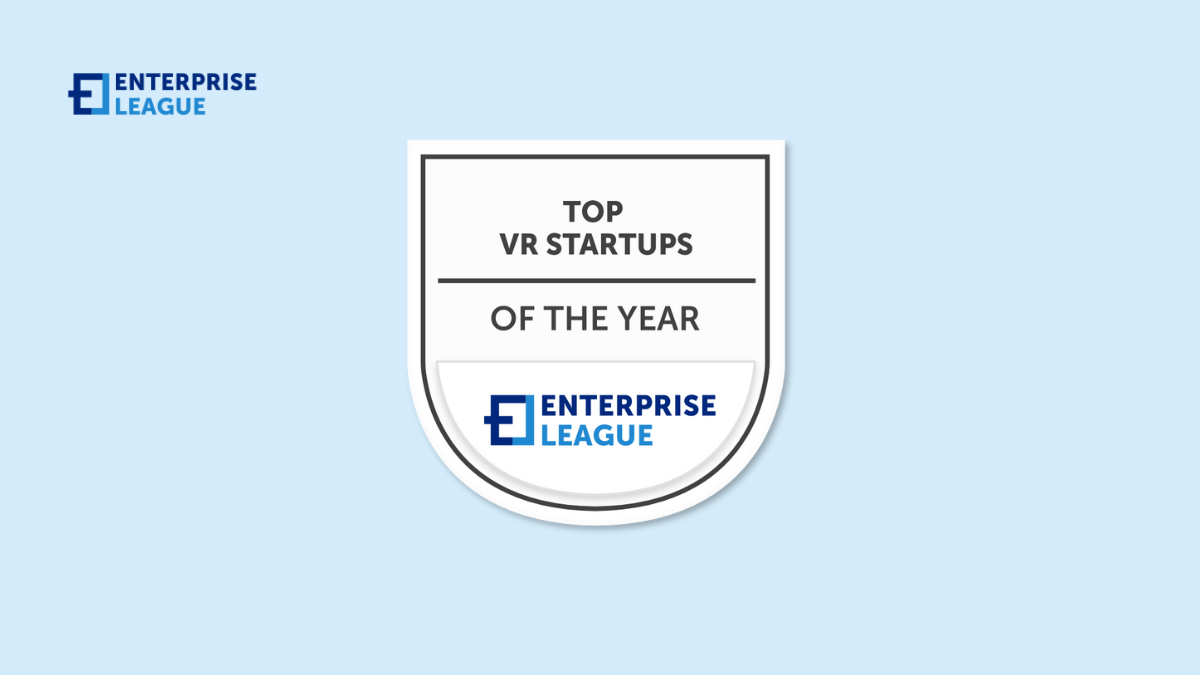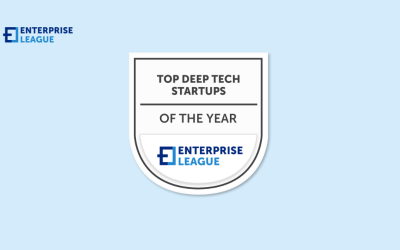From healthcare to gaming, VR startups are revolutionizing many industries by providing immersive and interactive experiences for their customers. The vast options for implementing VR technology in many industries are very tempting for aspiring entrepreneurs.
The rise of VR startups should not surprise as the VR global market is projected to grow by 13.72% from 2023 resulting in a market volume of US$52.05bn in 2027.
What are VR startups?
VR startups are using virtual reality technology to provide solutions for many industries – from construction to healthcare.
Obsess
Obsess enables retailers to build branded virtual shopping environments using VR and 3D technology. Their SaaS tools allow merchants of all sizes, from luxury fashion houses to telecom giants, to visually engage consumers within interactive virtual storefronts. Clients like Coach and AT&T use Obsess to prototype photorealistic product models for customers to view in VR, while Anheuser-Busch builds custom virtual lounges for personalized tastings.
Beyond modeling goods in expansive 3D detail, Obsess empowers retailers to embed social games and activities making shopping more immersive. With versatile worldbuilding capacities for any retail niche or unique brand identity, Obsess provides the AR/VR commerce infrastructure for pioneering consumer-facing Metaverse store concepts at scale.
Oncomfort
Founded in 2020, Oncomfort created VR experiences to ease discomfort during wound care, injections, and procedures. The fully integrated VR system features relaxation programs for pain and stress reduction through immersion.
Oncomfort’s VR therapy directs patients’ attention away from physical sensations. Soothing audio, visuals and coaching help patients develop coping and mindfulness techniques. Providers see faster healing and improved wellbeing.
Niantic
Founded in 2010, Niantic creates enhanced reality experiences that integrate digital information with the physical world. Their mobile apps leverage AR, geolocation, and mapping technologies.
Flagship products include Pokémon GO and Ingress, which power immersive gameplay by transforming neighborhoods into virtual worlds. Niantic also provides an AR developer platform.
Nearpod
Founded in 2012, Nearpod modernizes classroom engagement through multimedia lessons, formative assessments, and data analytics. Teachers can gauge participation and comprehension in real-time.
Nearpod’s suite includes virtual reality field trips, PhET science simulations, formative insights, and easy LMS integration. The startup aims to make active learning simple, engaging, and impactful.
Labster
Founded in 2011, Labster offers realistic digital labs covering biology, chemistry, engineering, and other STEM subjects. Students perform experiments and apply science skills in risk-free simulated environments.
The immersive simulations enhance lab preparedness, conceptual understanding, and scientific inquiry abilities. Analytics provide insights into learning gaps. Labster aims to make science education more engaging, effective, and accessible.
Soul Machines
Founded in 2016, Soul Machines develops Digital DNA – a platform for creating lifelike virtual assistants with customizable looks, personalities and emotions. Avatars can perceive facial expressions and respond appropriately.
Soul Machines’ avatars aim to enhance customer experience, marketing, and training through natural face-to-face interaction powered by AI. Their technology brings a human touch to digital engagement.
Decentraland
Launched in 2020, Decentraland operates as a shared virtual world where users can explore 3D environments, purchase digital land and assets, and connect with others socially. The decentralized metaverse is owned by its users.
Using MANA, Decentraland’s cryptocurrency token, users can buy land parcels to build virtual worlds limited only by their imagination. The community-governed platform allows worlds and applications to be designed collaboratively.
Avataar.Me
Founded in 2018, Avataar.Me creates immersive brand experiences leveraging 3D, VR, and AR technology. Their solutions help companies enhance storytelling and customer engagement through virtual try-ons, digital events, and interactive apps.
Avataar.Me’s capabilities empower next-gen social and retail that blurs the line between digital and physical. For brands, their technology unlocks more lifelike, memorable connections with audiences.
CLO Virtual Fashion
Founded in 2009, CLO offers a digital garment creation platform enabling 3D design, prototyping, and visualization. Brands leverage CLO to streamline design, test styles virtually, and market products through digital twins.
CLO’s physics-based cloth simulation produces ultra-realistic textile movement and drape. This provides accurate digital sampling early in the product creation process.
Heru
Founded in 2017, Heru has developed AI and computer vision technology for assessing vision disorders and optimizing eye health. Their applications enable analyzing eye alignment, tracking, and focus to identify issues.
Heru then provides corrective lenses and therapeutic treatments tailored to an individual’s needs and lifestyle. The software optimizes vision performance and comprehension.
Cluster
Launched in 2020, Cluster provides tools to create branded virtual spaces for events, communities, and interactive experiences. Users can easily build 3D worlds and stream live content.
By making metaverse environments accessible, Cluster enables businesses, creators, and communities to engage audiences through immersive social experiences online.
As virtual interaction gains traction, expect platforms like Cluster to play an increasingly vital role in bringing people together through technologies like VR and livestream video.
Holoride
Founded in 2018, Holoride syncs VR content with physical car motions and routes to create immersive in-vehicle entertainment. Their tech dynamically adapts VR experiences to match real ride sensations.
By tapping into a car’s real-time motion, Holoride aims to provide passengers with engaging VR tours, games, and adventures that transform ordinary commutes into hyper-realistic thrill rides
GITAI
Founded in 2018, GITAI develops humanoid robots capable of replicating human motion and tasks in space. Their robots aim to automate hazardous workloads in orbital and planetary environments.
By providing a robotic workforce in space, GITAI hopes to enable continuous commercial activity in zero-gravity without risk to human life. Their technology could help build and maintain future space infrastructure.
Didimo
Founded in 2016, Didimo uses AI and computer vision to generate animated human likeness avatars from photos. Their autonomous avatar creation technology converts images into virtual characters in minutes.
Didimo allows consumers, gaming firms, and enterprises to utilize realistic digital twins for uses like virtual try-on, VR collaboration, and customized interactive content.
Anything World
Launched in 2021, Anything World allows users to build virtual worlds and customize intelligent NPCs using just voice commands. The conversational AI handles worldbuilding requests and character programming.
The platform enables anyone to create dynamic metaverse environments inhabited by interactive characters without coding. Players can then adventure through personalized worlds via voice with friends.
SLAMcore
Founded in 2016, SLAMcore aims to provide the spatial awareness and perception capabilities needed for the next generation of autonomous devices. Their software integrates sensor data from cameras, lidars, and inertial measurement units to track motion and build detailed 3D maps.
Major players like food delivery service Postmates and robotics company Robby Technologies have adopted SLAMcore to navigate effectively on sidewalks and inside buildings.
Amelia Virtual Care
Founded in 2017, Amelia aims to leverage VR technology to provide more personalized mental healthcare. Their goal is to improve outcomes by deeply immersing patients in simulations that feel real but can be carefully calibrated by clinicians.
Amelia’s VR therapy has shown promising results in clinical pilots for treating PTSD, social anxiety, panic disorder, and more.
Beem
Founded in 2020, Beem’s goal is to enable meaningful human connections and advice-sharing within the emerging metaverse. Their technology has the power to make extended reality feel less isolating and more human-centric.
Beem is being used by companies for training, marketing, and customer service applications, with real humans driving the avatar interactions. This allows businesses to incorporate metaverse elements while still providing human touchpoints.
Futures Factory
Launched in 2019, Futures Factory is designed for both sneaker collectors and casual fashion enthusiasts. The immersive digital experiences attached to the physical shoes create a deeper connection for owners. Fans can interact with their favorite sneakers in new virtual settings.
For sneaker companies, Futures Factory also provides an outlet to debut exclusive new launches. Limited edition shoes can be “dropped” online, integrated with digital experiences that generate buzz. This direct-to-consumer channel offers expanded sales capabilities.
Moonhub
Founded in 2019, Moonhub is bringing cutting-edge VR technology to transform corporate learning. Active experiential training in VR has been shown to drive better skill retention compared to passive methods. By engaging multiple senses, VR can elevate workforce training and build empathy.
Moonhub is being used by companies to educate employees on topics like leadership, public speaking, sales, harassment prevention, and more.
Pimax
Founded in 2014, Pimax aims to push the limits of consumer virtual reality experiences through cutting-edge display and optics technology. Their headsets provide significantly sharper visuals and wide fields of view.
Key Pimax models like the 8KX offer high resolution paired with hardware innovations like wide200° lenses and mechanical IPD adjustment. This provides an extra-immersive and comfortable VR experience.
Conclusion
Every industry is feeling the impact of virtual reality as VR startups are bringing to market innovative and creative solutions that can be implemented to change the way we shop, entertain ourselves, and conduct business.
Discover more creative startups that might interest you:
- Engineering startups are changing the world with creative solutions.
- Blooming drone startups that are revolutionizing almost every industry,
- Mind-blowing retail solutions by the world’s most ambitious retail startups.
- Creative renewable energy startups that are on a mission to cleaner Earth.
- Innovative gaming startups that are improving the gaming industry
Related Articles
The role of legal services in business disputes
With the advent of new technologies and the changing legal industry, the role of legal services had changed and become crucial across various business disputes.
21 HR startups with innovative solutions in 2024
Lets take a look at these 21 HR startups that are taking talent acquisition into the future with AI recruitment and innovative approach to remote collaboration.
22 deep tech startups with innovative solutions (2024)
From fusion energy to regenerative medicine, deep tech is pushing the boundaries of what’s possible. These 22 deep-tech startups are shaping the future.
The role of legal services in business disputes
With the advent of new technologies and the changing legal industry, the role of legal services had changed and become crucial across various business disputes.
21 HR startups with innovative solutions in 2024
Lets take a look at these 21 HR startups that are taking talent acquisition into the future with AI recruitment and innovative approach to remote collaboration.








